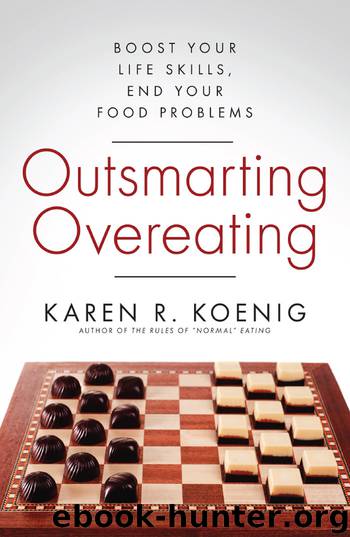Outsmarting Overeating by Karen R. Koenig

Author:Karen R. Koenig
Language: eng
Format: epub
Publisher: New World Library
Get Smart!
How do you feel when your routines become too rigid or excessive? How do you feel when you don’t have or don’t follow routines at all? Specifically, what could you do to remain more in balance?
Now, back to the term self-regulation. If you’re not exactly sure what I mean by it, try these examples on for size:
•You hardly ever exercise, but you sporadically go on intense weekend boot camps, which, the next day, make your body feel as if it’s been run over by a truck.
•When you join a gym, you insist on going either every day or for two hours at a clip, even though neither is feasible given your schedule, so you eventually stop going altogether.
•You rarely buy clothes for yourself, but when you do it’s a mega shopping spree and you come home with oodles of items that you look at and think, “When will I ever wear this?”
•You have a hard time leaving work on time almost every night, even though pretty much everyone else zips out the door at five sharp.
•Your home is either a mess or spotless.
•You usually let other people make decisions for you, which builds up a head of resentment in you until, one day, you put your foot down and freak out everyone when you insist, irrationally, that some petty thing must be done your way.
•You spend so much time with your social network in cyberspace that you miss out on real time with friends, so you unsubscribe to all your favorite sites, until you’re in such deep withdrawal that you sign up again on them all.
•You either stuff your feelings or can’t stop crying, screaming, or moping around.
•You pledge to go to sleep at a reasonable hour and do it self-righteously for a week, then lapse back into hitting the sack long after your body and mind have quit for the day.
•If you can’t do something perfectly, or at least exceedingly well, you either don’t do it at all or you’re miserable the whole time you’re doing it, because you feel like a failure.
These may seem like normal, everyday actions to you, but they’re examples of dysregulation. It’s as if you were born with only an on-off switch and no calibration in between. If you have dimmer switches on the lights in your home, you know what I mean by what’s “in between”: there’s a whole range between blindingly bright light and dim light in which you can barely see your hand. Just as the volume control on your iPhone or TV is a continuum, you, as a human instrument, also possess a finely tuned control mechanism, but one that’s been stuck in the on-off position. The skill you want to develop is to identify, value, and use its calibrations.
Download
This site does not store any files on its server. We only index and link to content provided by other sites. Please contact the content providers to delete copyright contents if any and email us, we'll remove relevant links or contents immediately.
The Plant Paradox by Dr. Steven R. Gundry M.D(2620)
Heartstopper Volume 3 by Alice Oseman(2202)
Beauty Sick by Renee Engeln PhD(1844)
50 Ways to Soothe Yourself Without Food by Susan Albers(1792)
Mindful Eating by Jan Chozen Bays(1575)
Just Three Words (Soho Loft #2) by Melissa Brayden(1554)
Skin by Unknown(1422)
The Golden Cage by Camilla Läckberg(1414)
Brave Girl Eating by Harriet Brown(1348)
The Archetype Diet by Dana James & Mark Hyman(1306)
Women Food and God: An Unexpected Path to Almost Everything by Roth Geneen(1271)
A Memoir of Anorexia and Bulimia by Wasted(1222)
Wasted Updated Edition by Marya Hornbacher(1209)
Brave Girl Eating: A Family's Struggle With Anorexia by Harriet Brown(1207)
Hungry by Sheila Himmel(1187)
Big Girl: How I Gave Up Dieting and Got a Life by Kelsey Miller(1172)
Mothers, Daughters, and Body Image by Hillary L. McBride(1163)
My Secret Life by Leanne Waters(1162)
Unbearable Lightness: A Story of Loss and Gain by Rossi Portia de(1158)
